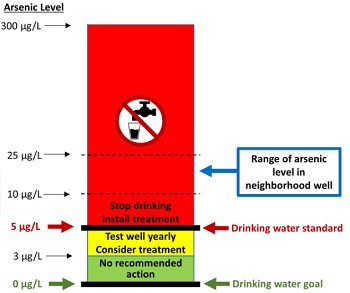Superfund Research Program
October 2020

Example of graphic used to inform households of potential elevated arsenic levels in their neighborhood.
(Photo courtesy of Flanagan et al., Sci Total Environ, 2020)
In a pair of recent publications, researchers from the Columbia University SRP Center demonstrated a strategy to improve private well testing for arsenic. They also showed that water treatment systems effectively reduced arsenic water levels and may reduce the likelihood of developing cancer.
In the first study, led by Community Engagement Core leader Yan Zheng, Ph.D., the team used previous well testing records to identify neighboring homes that may have high levels of arsenic. They then used this data along with clear messaging to communicate to the households about the increased likelihood of high arsenic levels. Their approach more than doubled the efficiency of untargeted water testing by identifying a larger proportion of potentially high-arsenic wells and increasing participation in well testing.
The team found that 60% of wells identified within 500 feet of a previously tested high arsenic well exceeded the New Jersey safety standard of 5 micrograms per liter. According to the study authors, their targeted approach successfully identified more high-arsenic wells than traditional approaches and increased testing among households by making the information personally relevant.
In the second study, led by Zheng and Research Translation Core leader Steven Chillrud, Ph.D., the researchers found that homeowners in Maine and New Jersey who used treatment systems to remove arsenic from well water benefited from a 7-fold reduction in both arsenic water levels and the likelihood of developing cancer. The team evaluated the effectiveness of household arsenic treatment systems in both states to understand how untreated well water chemistry and other factors influence arsenic removal.
The team reported that systems treating high arsenic levels did not perform as well as those treating lower arsenic levels, and systems installed or maintained by homeowners did not perform as well as those installed or maintained by vendors. In general, treatment effectively reduced arsenic levels in well water up to two orders of magnitude. The researchers also determined that a 7-fold reduction of arsenic in treated water reduced the likelihood of developing skin cancer from 3765 in 1 million to 514 in 1 million in Maine, and from 568 in 1 million to 75 in 1 million in New Jersey.
Together, these studies demonstrate the effectiveness of targeted messaging to improve well water testing and provide information that can help households make informed choices in selecting and maintaining arsenic treatment systems.


